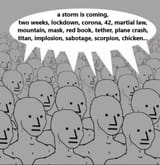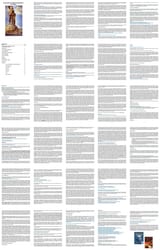Anonymous
(ID: 406UBSBP)
 8/18/2025, 10:31:13 AM
No.513351387
>>513351860
>>513351912
>>513352649
>>513355914
8/18/2025, 10:31:13 AM
No.513351387
>>513351860
>>513351912
>>513352649
>>513355914
Just tell the truth
I think where we went wrong as a society is when we started lying and telling half-truths.
>yes, drugs do actually feel amazing but if you do too much of them you're gonna fuck your life up in these ways: etc...
>yes, racism feels good, but if you buy into it too wholeheartedly, you're gonna destroy society because of x and y
>yeah, we can totally see how you might have thought that there's a Jewish conspiracy, and there's a real appeal in accepting an easy determinism over real ambiguity, but it's ultimately spurious because...
Etc. I think the biggest failing of the mainstream was the unwillingness to recognize that we were (and still are) in a moment where people are asking "why" to all these things a lot of us accept as fundamental truths. Our unwillingness to simply explain to people why simple things like "democracy is good" and "racism is bad" are lessons we learned in blood. Instead, people package them up as black boxes and instead of rigorously defending them, tried to socially engineer and shame the "why," which crucially was first asked in good faith (and obviously now is not). This unwillingness to answer "why" and defend the precepts that matter so much are the substrate in which this epistemic rupture happened.
>yes, drugs do actually feel amazing but if you do too much of them you're gonna fuck your life up in these ways: etc...
>yes, racism feels good, but if you buy into it too wholeheartedly, you're gonna destroy society because of x and y
>yeah, we can totally see how you might have thought that there's a Jewish conspiracy, and there's a real appeal in accepting an easy determinism over real ambiguity, but it's ultimately spurious because...
Etc. I think the biggest failing of the mainstream was the unwillingness to recognize that we were (and still are) in a moment where people are asking "why" to all these things a lot of us accept as fundamental truths. Our unwillingness to simply explain to people why simple things like "democracy is good" and "racism is bad" are lessons we learned in blood. Instead, people package them up as black boxes and instead of rigorously defending them, tried to socially engineer and shame the "why," which crucially was first asked in good faith (and obviously now is not). This unwillingness to answer "why" and defend the precepts that matter so much are the substrate in which this epistemic rupture happened.


